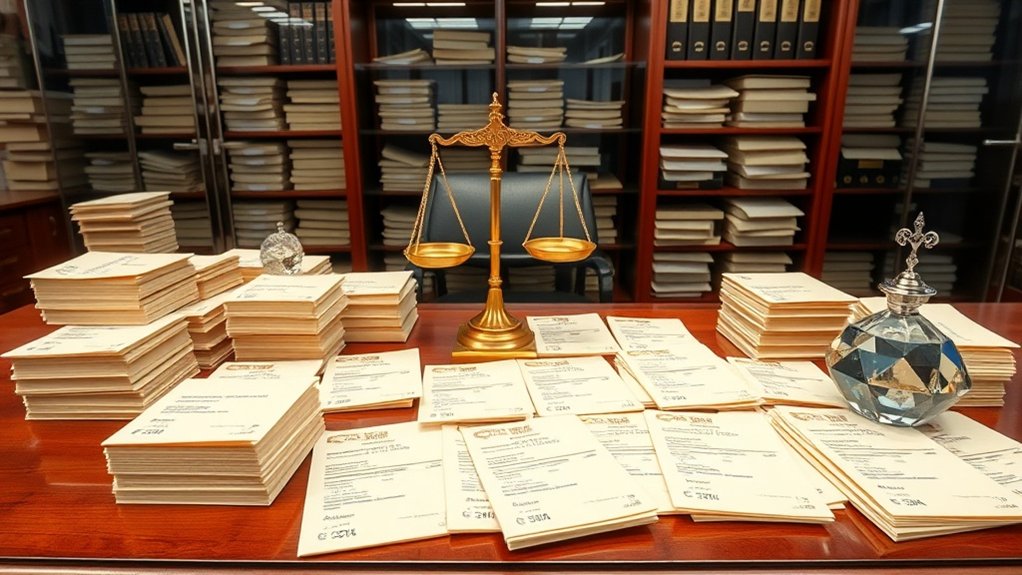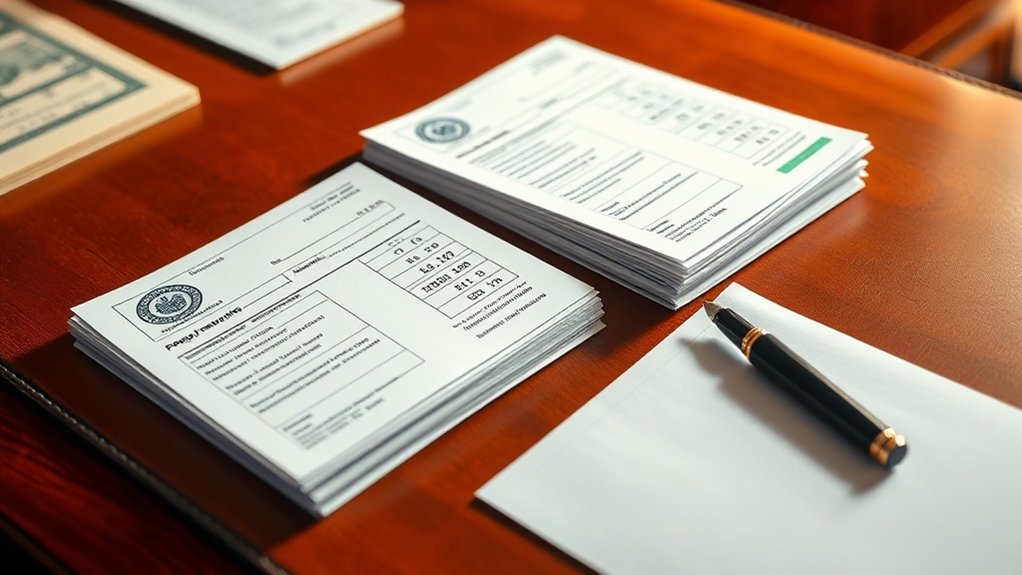You’ve likely experienced the frustration of having legal documents rejected due to fee calculation errors or improper payment documentation. When you’re working within Brazil’s intricate judicial system, even minor mistakes in GRU receipts or payment slips can derail your entire case timeline. Vieira Braga Lawyers understands that these seemingly administrative details aren’t just paperwork—they’re the foundation that determines whether your legal strategy moves forward or gets stuck in bureaucratic limbo.
Understanding Brazil’s Complex Judicial Fee Structure

When navigating Brazil’s legal system, you’ll encounter one of the most intricate judicial fee structures in Latin America. Each court level maintains distinct fee schedules, from municipal courts handling small claims to federal supreme court proceedings. You’ll need to calculate fees based on case value, procedural type, and jurisdiction.
The system requires different payment methods depending on your case’s nature. Civil proceedings typically demand upfront judicial costs, while criminal cases often involve bail deposits and administrative fees. You’ll also face varying deadlines for each payment type, with some requiring immediate settlement and others allowing installment plans.
Understanding GRU (Guia de Recolhimento da União) receipts becomes crucial for federal court matters. These government collection guides ensure proper fee allocation to correct accounts. You can’t afford errors in GRU completion, as mistakes delay proceedings and may result in case dismissal. Each receipt requires specific codes matching your case type and court jurisdiction.
For immigration-related court proceedings, you should budget for specialized legal assistance ranging from R$ 3,000 to R$ 10,000 depending on case complexity and required documentation.
Common Errors That Lead to Case Delays and Rejections
Despite the complexity of Brazil’s fee structure, most case delays and rejections stem from preventable mistakes that legal practitioners make repeatedly. You’ll find that incorrect fee calculations top the list of errors, often resulting from misreading current fee schedules or applying outdated rates. Payment slip mistakes follow closely—you might enter wrong codes, select incorrect payment categories, or input inaccurate case values.
Timing errors create significant problems too. You can’t afford to miss payment deadlines or submit documentation after established cutoff dates. Missing supporting documents frequently trigger rejections, especially when you forget to attach required certificates or authorizations.
GRU receipt errors compound these issues. You’ll face delays when uploading illegible receipts, submitting partial payment confirmations, or failing to match receipt numbers with case files. Bank processing errors also occur when you select wrong banking channels or experience system failures during electronic transfers. These procedural mistakes often lead to application denial, creating additional complications for clients who must restart the entire immigration process.
Vieira Braga’s Systematic Approach to Document Verification

You’ll find that Vieira Braga employs a comprehensive three-tier system that addresses multi-layer document validation to catch inconsistencies before they become costly delays. Their error detection protocols automatically flag common mistakes in fee schedules and payment documentation, while built-in quality assurance standards ensure every submission meets regulatory requirements. This systematic approach transforms what’s traditionally been a reactive process into a proactive validation system that protects your cases from rejection. With transparent pricing starting from initial consultations, clients can budget effectively while ensuring their documentation meets all immigration authority standards without surprise costs or delays.
Multi-Layer Document Validation
Since payment processing involves multiple stakeholders and complex documentation flows, you’ll need a robust validation framework that catches errors before they cascade through your entire fee schedule system. Vieira Braga’s multi-layer approach ensures each document passes through rigorous checkpoints that verify accuracy and compliance.
Their validation process incorporates three essential verification layers:
- Primary Data Verification – Cross-references fee amounts, payment dates, and recipient information against established schedules
- Regulatory Compliance Checks – Validates documents meet current legal requirements and formatting standards
- System Integration Verification – Ensures seamless data flow between payment platforms and administrative systems
You’ll benefit from real-time error detection that prevents costly mistakes and delays. This systematic approach reduces manual review time while maintaining the highest accuracy standards for GRU receipts and payment documentation. Professional legal representation ensures compliance with immigration documentation requirements and reduces the risk of administrative errors that could impact your case status.
Error Detection Protocols
Building on these verification layers, Vieira Braga’s error detection protocols operate through automated scanning algorithms that identify discrepancies within milliseconds of document submission. You’ll receive immediate alerts when the system detects formatting inconsistencies, incorrect payment codes, or mismatched amounts across your documents.
The protocols cross-reference your data against official databases, flagging outdated fee structures or invalid payment categories before you submit anything. You won’t waste time resubmitting corrected documents because the system catches errors upfront.
When discrepancies appear, you’ll see specific error codes that pinpoint exactly what needs fixing. The system highlights problematic fields in red and provides suggested corrections. You can track error patterns through detailed reports, helping you prevent similar mistakes in future submissions while maintaining document accuracy standards.
This comprehensive error prevention approach helps avoid the financial penalties and processing delays that can result from documentation mistakes in immigration procedures.
Quality Assurance Standards
Beyond error detection lies Vieira Braga’s comprehensive quality assurance framework that validates every aspect of your document processing workflow. You’ll benefit from systematic verification protocols that ensure accuracy across all fee schedules, payment slips, and GRU receipts.
This robust system implements three critical quality control measures:
- Multi-tier validation process – Each document undergoes sequential review stages with specialized checkpoints for mathematical calculations, formatting compliance, and regulatory adherence.
- Real-time monitoring dashboard – You’ll track document status, identify bottlenecks, and receive instant notifications about processing anomalies or completion milestones.
- Automated compliance verification – The system cross-references current legal requirements, tax regulations, and institutional guidelines to prevent regulatory violations.
You’re guaranteed consistent, error-free documentation that meets professional standards while reducing processing time and administrative overhead. Vieira Braga’s immigration specialists provide personalized evaluations to ensure your documentation aligns with specific legal requirements and minimizes the risk of application denials.
Federal Vs State Fee Requirements: Key Differences

While federal agencies establish baseline payment requirements across all states, individual state governments often impose additional fees and distinct processing procedures that can significantly impact your total costs. You’ll encounter federal standardization in areas like immigration, taxation, and interstate commerce, where GRU receipts follow uniform formatting and payment channels. However, state requirements diverge substantially in business licensing, professional certifications, and local permits.
Federal payments typically process through centralized systems with consistent timelines, while state processing varies dramatically. You might face same-day clearance in one state versus week-long delays in another. Fee structures also differ—federal rates remain fixed nationally, but states set their own pricing tiers based on local regulations.
Understanding these distinctions prevents costly mistakes. You can’t assume a payment method accepted federally will work at the state level. Each jurisdiction maintains separate vendor relationships, banking protocols, and compliance standards that directly affect your fee schedule accuracy and payment slip validation. Professional assistance from immigration lawyers can help navigate these complex payment requirements and ensure proper documentation compliance across different jurisdictions.
GRU Receipt Processing and Compliance Standards
When processing GRU receipts, you must adhere to specific compliance standards that govern documentation, validation, and record-keeping requirements. These standards ensure your payments meet federal regulatory expectations and prevent processing delays that could jeopardize your legal proceedings.
You’ll need to implement systematic verification procedures that check payment amounts against current fee schedules. Each GRU receipt requires proper authentication through the federal payment system, confirming that funds have been successfully transferred and allocated to the correct judicial account.
Essential compliance elements include:
- Digital verification – Cross-reference receipt numbers with federal database entries to confirm payment authenticity
- Documentation retention – Maintain organized records for minimum statutory periods as required by federal regulations
- Error correction protocols – Establish procedures for addressing payment discrepancies or system rejections promptly
Your compliance framework should incorporate regular audits of GRU processing workflows. This proactive approach identifies potential issues before they impact case timelines or create administrative complications with federal courts.
Proper documentation and fee compliance become especially critical when handling immigration cases, where application processes must be meticulously managed to avoid delays or denials that could affect visa approvals.
Payment Slip Accuracy: Critical Elements for Success

You’ll achieve payment slip accuracy by focusing on three critical components that determine processing success. First, you must identify and complete all essential data fields correctly to prevent delays and rejections. Next, you’ll implement common error prevention strategies and establish systematic verification process steps that catch mistakes before they become costly problems. Immigration documentation requires the same level of precision, as errors in visa applications can lead to costly delays and potential rejections that complicate your legal status in Brazil.
Essential Data Fields
Since payment slip errors can derail your entire billing process, understanding which data fields require absolute precision becomes your first line of defense against costly mistakes. You’ll need to focus on specific elements that determine whether your payment reaches its intended destination successfully.
The most critical data fields you can’t afford to get wrong include:
- Recipient identification numbers – CPF, CNPJ, or institutional codes must match exactly with your recipient’s registered information
- Payment amounts and due dates – Even small discrepancies in values or timing can trigger automatic rejections
- Bank routing details – Account numbers, agency codes, and payment method specifications require perfect accuracy
Double-checking these essential fields before submission prevents processing delays and ensures your payments flow smoothly through the system. Given that immigration legal services can range from R$ 5,000 to R$ 30,000 depending on case complexity, ensuring accurate payment processing becomes even more crucial for these significant financial transactions.
Common Error Prevention
Beyond identifying which fields demand accuracy, implementing systematic checks catches errors before they become expensive problems. You’ll prevent most mistakes by establishing verification protocols that scrutinize recipient details, payment amounts, and due dates before submission.
Double-check bank codes and account numbers against official records—typos here create payment delays and additional fees. Verify tax identification numbers match exactly with government databases, as mismatches trigger automatic rejections.
Create checklists for recurring payments to maintain consistency across multiple transactions. You should also validate calculated interest and penalties using current rates, since outdated percentages cause underpayments.
Set up automated alerts for approaching deadlines, giving yourself buffer time to correct any discovered errors. Finally, maintain backup documentation for every payment slip generated, enabling quick resolution when discrepancies arise during processing.
Verification Process Steps
Although error prevention strategies form your foundation, implementing a structured verification process transforms good intentions into reliable results. You’ll need systematic checkpoints that catch discrepancies before they become costly mistakes.
Your verification workflow should include these essential steps:
- Cross-reference beneficiary data – Compare recipient information against official databases and confirm banking details match registered records
- Validate calculation accuracy – Verify mathematical computations, tax withholdings, and fee applications using independent calculation methods
- Conduct final review protocols – Perform comprehensive document checks including formatting, compliance requirements, and authorization signatures
Don’t rush through verification stages. Each checkpoint serves as your safety net, preventing payment processing delays and maintaining client trust. Remember, thorough verification today prevents expensive corrections tomorrow.
Technology Solutions for Error-Free Financial Documentation

When you implement the right technology solutions, you’ll dramatically reduce errors in your fee schedules and payment slips while streamlining your entire financial documentation process. Automated data validation systems catch calculation mistakes before they reach clients, while integrated software platforms eliminate manual data entry errors that commonly occur when transferring information between systems.
You’ll benefit from digital templates that auto-populate client information and apply correct fee structures based on case types. Cloud-based document management systems ensure you’re always working with the most current forms and regulations, preventing outdated template usage.
Real-time integration with banking systems verifies account numbers and payment details instantly, reducing rejected transactions. OCR technology scans and validates existing documents, flagging inconsistencies automatically.
Digital workflow automation routes documents through proper approval channels, ensuring compliance checks occur at each stage. These solutions create audit trails, making it easier to track changes and identify error sources when issues arise.
Cost-Benefit Analysis of Professional Fee Management Services
While outsourcing your fee management initially seems like an added expense, the financial returns often justify the investment within the first year of implementation. You’ll eliminate costly errors that result in rejected payments, delayed processes, and administrative rework. Professional services streamline your operations, reducing the time your staff spends on documentation tasks.
The key financial benefits include:
- Error reduction costs – Professional services typically reduce fee documentation errors by 90%, eliminating reprocessing expenses and late payment penalties
- Staff productivity gains – Your team can focus on billable work instead of administrative tasks, increasing revenue potential by 15-25%
- Compliance assurance – Avoiding regulatory fines and maintaining good standing with courts and agencies protects your firm’s reputation and prevents costly violations
When you calculate the true cost of internal errors, staff time, and potential compliance issues, professional fee management services often pay for themselves through improved efficiency and reduced risk exposure.
Protecting Your Legal Timeline Through Proper Documentation

Beyond the financial advantages of streamlined fee management, you’ll discover that proper documentation serves as your legal practice’s most reliable safeguard against missed deadlines and procedural missteps. When you maintain accurate records of fee payments and GRU receipts, you’re creating an unbreakable chain of evidence that protects your clients’ cases from dismissal or delays.
Your documentation system becomes particularly crucial during court proceedings where judges scrutinize payment timelines. A single missing receipt or incorrectly processed fee can derail months of legal work. You’ll find that Vieira Braga Advogados’ systematic approach eliminates these risks by ensuring every payment generates verifiable proof of compliance.
Don’t underestimate how proper documentation strengthens your professional credibility. When you present meticulously organized payment records, you demonstrate competence that builds trust with clients and courts alike. This attention to detail often determines whether your legal arguments receive serious consideration or face unnecessary skepticism.
Frequently Asked Questions
What Happens if I Discover an Error After Submitting My Payment?
If you discover an error after submitting your payment, you’ll need to contact the relevant authority immediately to report the mistake. Don’t attempt to make another payment right away, as this could create duplicate charges. You’ll likely need to provide documentation proving the error occurred. Depending on the specific situation, you may receive a refund or credit, or you might need to submit additional paperwork to correct the issue.
Can Vieira Braga Handle Fee Calculations for International Legal Proceedings?
Yes, you can rely on Vieira Braga to handle fee calculations for international legal proceedings. They’ll navigate complex cross-border payment requirements, convert currencies when needed, and ensure you’re meeting all jurisdictional fee obligations. Their expertise extends beyond domestic cases to international litigation, arbitration, and regulatory matters. You won’t need to worry about miscalculating fees across different legal systems or missing critical payment deadlines.
How Long Does Document Verification Typically Take for Urgent Cases?
You’ll typically receive document verification for urgent cases within 24-48 hours at Vieira Braga. They’ve streamlined their process to prioritize time-sensitive matters, ensuring you won’t face delays when deadlines are tight. If you’re dealing with court filings or international proceedings requiring immediate attention, they’ll expedite the verification process. You can expect faster turnaround times compared to standard cases, often completing verification within the same business day.
Are There Discounts Available for Bulk Fee Processing Services?
You’ll find bulk processing discounts available when you’re handling large volumes of fee schedules and payment documentation. The discount tiers typically start at 20+ documents, with increasing savings for higher quantities. You can expect 10-15% off standard rates for medium batches and up to 25% savings for extensive bulk orders. Contact directly to discuss your specific volume requirements and receive customized pricing that’ll maximize your cost savings.
What Backup Systems Exist if Electronic Payment Systems Fail?
You’ll have multiple backup options when electronic systems fail. You can generate physical payment slips that work at any bank branch or authorized payment center. You’ll also access alternative online banking platforms if your primary system’s down. Paper-based GRU forms remain available for government fee payments. You can use ATMs for basic transactions, and phone banking services provide another reliable backup method for processing payments.
Conclusion
You’ll save significant time and money by partnering with Vieira Braga Lawyers for your fee schedule management. Their three-tier validation system eliminates costly errors that can derail your legal proceedings. You won’t face unnecessary delays or rejections when they’re handling your payment slips and GRU receipts. You’re investing in precision that protects your case timeline and ensures regulatory compliance. Don’t risk your legal success with amateur documentation mistakes.



